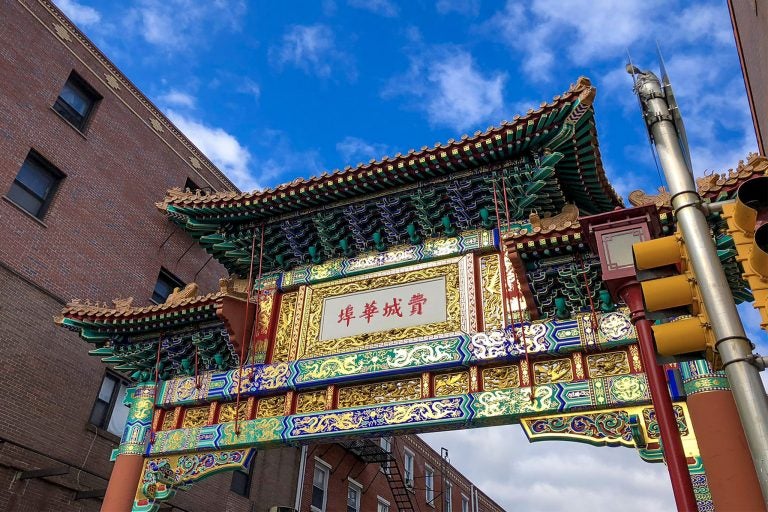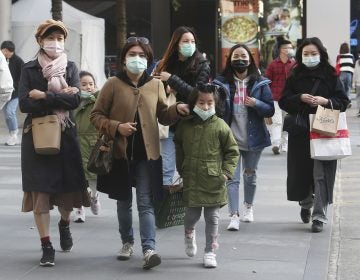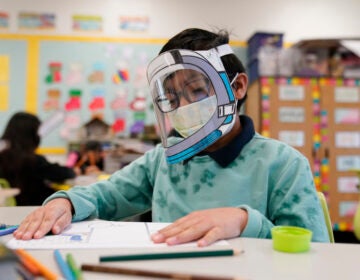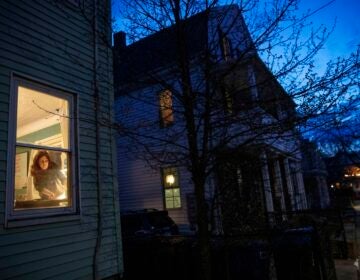‘Chinatown is pretty quiet’: Coronavirus scare upends Philly businesses, schools and travel plans
Officials say there’s no cause for panic, but are implementing widespread efforts to contain the disease.

Chinatown business owners say they've noticed lower foot traffic this week. (Danya Henninger/Billy Penn)
The streets of Philadelphia’s Chinatown on Friday were still strewn with bits of red confetti from a lively New Year celebration the weekend prior, but business owners said foot traffic in the neighborhood is down since news about possible cases of novel coronavirus began to spread.
“The whole Chinatown is pretty quiet,” said Jin Huang, who runs Lair KTV karaoke bar. He estimated the song house at 10th and Arch was seeing about 30% of its normal traffic.
Erica Zeng, a 26-year-old assistant manager at hot pot restaurant Chubby Cattle, said she noticed a similar downturn.
“Remember the first potential case happened in Philly? I think [when] that started happening, people are less coming,” Zeng said.
Huang and Zeng’s experience was echoed by nine other proprietors and workers in Chinatown, who also told Billy Penn and WHYY that business was unusually slow. Though some attributed it to families staying home during the Lunar New Year, most blamed the lull on coronavirus fears.
At the beginning of the week, news broke that a Chinese exchange student at William Penn Charter School was being tested for a possible case of the virus, which originated in Wuhan, a Chinese city of 11 million. As of Friday evening, there were nearly 10,000 global confirmed cases and more than 200 deaths, most of them in mainland China.
Across the United States, there have only been seven cases confirmed. In Philadelphia? Zero…so far.
As of Friday afternoon, the Philly Health Department was reviewing one possible case, according to spokesperson Jim Garrow, who said it was office policy not to comment on current investigations for fear of causing panic and unwarranted fear.
City officials have been careful to avoid sounding a loud alarm — repeating a refrain that the flu is more of a danger to Philadelphians’ health — but the potential for an outbreak has spooked many and upended various plans and lives across the region.
“I understand why people are afraid to come out,” said karaoke bar owner Huang, adding that he thinks it’s an overreaction. Chinatown is home to about 2,500 of the nearly 30,000 Chinese people living in Philadelphia, per the 2010 Census.
“We have no evidence right now that Philadelphia has any affected patients,” Huang said. “I mean, it’s all suspect.”
Drastic measures at Philly schools and universities
The student at Penn Charter tested negative, but not before the Quaker private school in East Falls abruptly ended the exchange program, asking all 18 students and their chaperones to return to their native China.
Penn Charter officials declined to elaborate further on their decision, but in a statement noted that the situation had led to canceled sports games, a driver denying students transportation, and a doctor rescinding a planned medical appointment.
The news of the potential case in Philly reverberated and spread quickly among local educational institutions.
Temple and the University of Pennsylvania are both prohibiting students from studying in China this semester, while any faculty, staff or student at Drexel will need written permission from the provost to travel there.
And on Friday, the Philadelphia Archdiocese sent a letter home advising that any Catholic school students returning from China would be required to stay home for 14 days, the length of time cited in incubation-period guidelines from the Centers for Disease Control and Prevention.
Such respiratory infections are considered dangerous because they have the potential to morph into pneumonia, and those with compromised immune systems, the elderly, and people who’ve recently undergone surgery are at a higher risk of complications that could lead to death.
But most people who contract the coronavirus will likely be sick for a few weeks and get better, just like the flu or another virus, health experts say.
For reference, the flu has already killed at least 795 people in the United States this year alone. It’s slightly less contagious than the current coronavirus — which is called “novel” because it’s new.
There have been other coronavirus outbreaks in recent years, most notably the SARS outbreak in 2003, which also caused a panic that took a toll on businesses in Philly’s Chinatown.
‘This is America. We’re going to be fine.’
The Philadelphia International Airport has been added to the list of locations where the Centers for Disease Control and Prevention will screen all passengers who have traveled through China.
Delta and American airlines have canceled all direct flights into or out of that country, and the Trump administration announced a ban on foreign nationals who have been to China in the past 14 days (with the exception of permanent residents and citizens’ immediate family members).
The point of all the restrictions, said epidemiologist Mike LeVasseur of Drexel, is to avoid another flu-like epidemic from being introduced into the world.
“We have a new disease, we have the ability to stop it from becoming a serious issue,” he told Billy Penn and WHYY. “We should put in the resources to make sure that this does not enter the general population.”
There are no restrictions on travel within the U.S., but Lindy Li, a political commentator and organizer in Philadelphia, said her mom went over the top to protect her on a flight from PHL to Iowa.
In addition to two bottles of hand sanitizer, she was loaded up with face masks — which were in such high demand, her mom had to hit seven Philadelphia pharmacies to purchase some, Li said.
“This is America, Mom,” Li said she told her mother. “We’re going to be fine.”
Her father, Richard Li, a Chinatown real estate company owner, said Chinese Americans are sending face masks home to their families on the mainland. “They sent over there for a kind of a gesture to support the motherland, to fight with the coronavirus.”
Chinatown restaurant worker Daniel, who declined to provide his last name, wears the masks himself and has noticed they’re low in stock at Philadelphia stores.
“I think it’s reasonable,” he said. “Because they don’t want to get infected like I don’t want to get infected.”
Avoiding Chinatown ‘doesn’t make any sense’
Fallout from the coronavirus scare reached the Free Library of Philadelphia when it canceled the daylong Chinese New Year celebration scheduled for this weekend.
Jennifer Chang, the chief of public services at the Parkway Central Branch who organizes the festivities each year, said that once the news of the virus spread, not enough performers wanted to participate.
“We asked them…tell us, is your show going on,” said Chang. “With everybody giving us feedback, the majority would like to postpone it.”
She attributed the resistance from the 100-member cast not to a sense of panic, but instead to close communication with loved ones in China, where there are widespread quarantines.
“The New Year is supposed to be happy,” said Chang, who is Chinese American and said she has multiple family members in China, including in Wuhan. “When you celebrate, you want to do it wholeheartedly. But then when you have uncle, friend, elementary friends who are suffering, [it’s] hard to dance and sing and to say, ‘Oh, this is happy, because we’re not affected by it.’”
Chang said the groups of dragon dancers and martial arts performers were talking about rescheduling the program for May, during Asian Heritage Month.
In Chinatown, Rays Cafe & Tea House was buzzing with business during Friday’s lunch rush. Owner Lawrence Ray said that while his business hadn’t been affected, he has noticed fewer pedestrians.
“I think people might’ve been a little bit worried, but right now it evened out,” said Ray. “We’re back to business as usual.”
Political organizer Li said she hoped people would begin concentrating on fixing the problem.
“I consider myself thoroughly American, but there’s a part of me that still hurts when I see people alleging that this is an inherently Chinese virus,” Li said. “I think everyone should just focus on alleviating the situation rather than these racial attacks.”
John Chin, head of the Chinatown Community Development Corp., said it’s important to note there still haven’t been any recorded coronavirus cases in Philadelphia.
“Chinatown is not a locale for the virus. It’s just not,” Chin said. “And to think that to avoid Chinatown [is] avoiding the virus doesn’t make any sense.”
WHYY is your source for fact-based, in-depth journalism and information. As a nonprofit organization, we rely on financial support from readers like you. Please give today.



![CoronavirusPandemic_1024x512[1]](https://whyy.org/wp-content/uploads/2020/03/CoronavirusPandemic_1024x5121-300x150.jpg)




